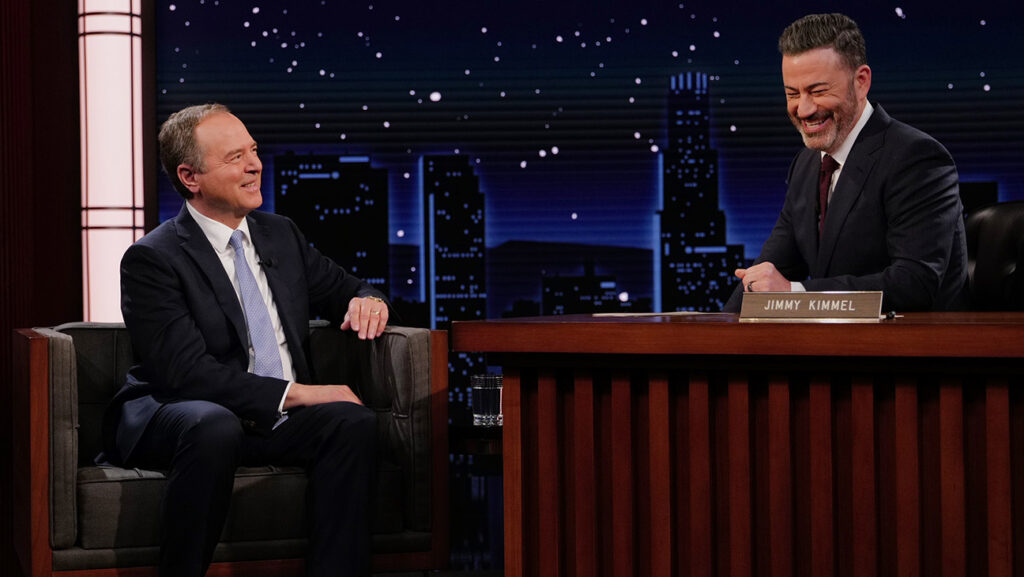For Hollywood’s political class, Jimmy Kimmel’s return to late night after a week-long suspension was a cause to celebrate — a crucial if momentary victory — for a town that’s been casting about for a way forward since Donald Trump re-entered the oval office in January. The question on the minds of many is whether the Democrats and industry activists can leverage what many see as government overreach and an assault on free speech by President Trump and his Federal Communications Commission chair Brendan Carr to their advantage.
Just a few days ago CNN’s chief data analyst Harry Enten gave a blistering on-air report that painted the Democrats — even amidst President Trump’s sagging approval ratings following a string of recent controversies — as the party that’s in trouble with American voters ahead of the 2026 midterms. “At this particular point, the ball may be on the ground, but the Democrats have not picked up the ball and run with it and if anything, it’s the Republicans who are running with the ball on the top issues,” he said. Nothing, it seemed, was working for the Democrats.
Then came Kimmel. The abrupt decision last week by Disney CEO Bob Iger and co-chairman of Disney Entertainment Dana Walden to yank Kimmel off the air sent waves of despair across an industry that had already seen various moguls and media companies bend the knee to the Trump administration over the past eight months. Both ABC News and Paramount paid out eight-figure sums to resolve various legal disputes with the administration and many viewed the announcement by CBS that Stephen Colbert’s show would not be returning next season as yet another capitulation to Trump. The night of Kimmel’s return, which saw a massive surge in viewers, the Democratic National Committee launched a digital ad campaign focused on Trump’s attacks on media companies.
As far as campaigns go, it was a small spend — just five figures — but its impact highlights how potent free speech and censorship are as issues across party lines. The 30-second ad was viewed over half a million times, and reached 40,000 unique voters, which is more than double the engagement that one would typically see on this type of campaign, says Abhi Rahman, deputy communications director for the Democratic National Committee. “Freedom of speech is an issue that transcends party lines,” says Rahman, who noted that much of the DNC’s spend went to pay for pre-roll ads that ran on both Ben Shapiro and Joe Rogan’s shows.
In the days following Kimmel’s suspension, Senators Rand Paul (R-Ky.) and Ted Cruz (R-TX) cautioned fellow Republicans about censorship and criticized Carr’s statements, and a recent Quinnipiac poll showed that fifty-three percent of voters say they’re pessimistic about freedom of speech being protected in the United States, while 43 percent are optimistic. The Kimmel campaign didn’t raise a huge sum of money, but according to Rahman, that wasn’t the point. “It felt like this was existential,” he says.
In a 24-hour news cycle, especially one that’s largely controlled by the Trump Administration, it’s anyone’s guess how long the Kimmel imbroglio will still stay top of mind. On November 4, California will be holding a special election to vote on Proposition 50, that, if passed would allow for a temporary override of state’s redistricting commission. The whole Kimmel affair could very well be a distant memory by then. “As a stand-alone event it’s not a magic bullet but it is part of a larger narrative of concerns and anxieties that many Americans — not just democrats but independents and even some Republicans — feel about government overreach in this moment,” says Steve Caplan, a veteran strategic communications consultant who now teaches at USC Annenberg School for Communication and Journalism.
If nothing else, Kimmel’s suspension and subsequent return re-centers Hollywood’s political class. “Will it bolster Hollywood and make donors more willing to engage? I think so. It shows relevancy and it’s a momentary win,” says Caplan. “The talent and the executives that stood tall and spoke out deserve credit, but I don’t think it changes how Hollywood is perceived from a messaging standpoint, and I certainly don’t think the battles with Trump are over by any stretch of the imagination.”

